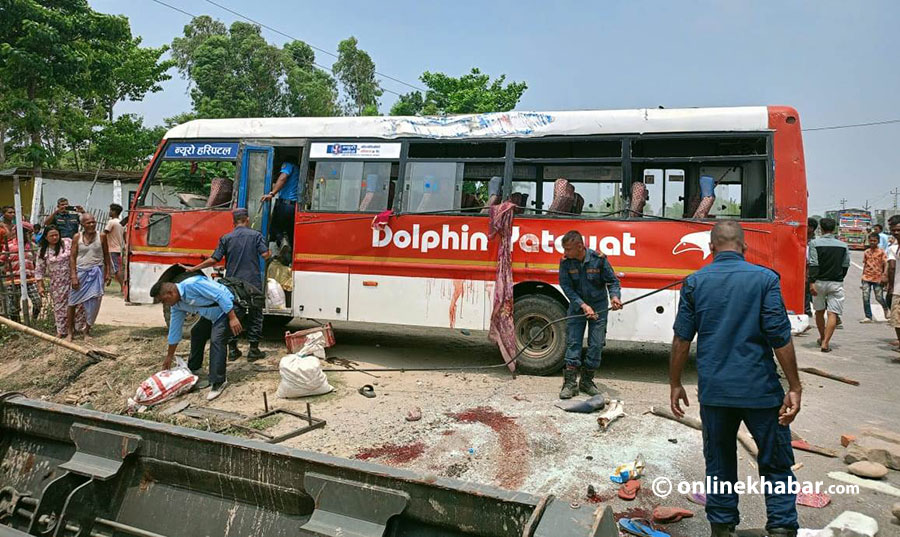President Bidya Devi Bhandari is leaving for China for a state visit on Wednesday, and this has been featured on all major national dailies along with Nepal’s its 12th Loktantra Diwas.
Here is a summary of important, ignored and interesting stories from the front pages of national broadsheets:
Important

President leaving for China, six agreements likely
Annapurna Post, Kantipur and The Himalayan Times report that Nepal and China will sign as many as six bilateral agreements including the Protocol of the Nepal-China Transit Transport Agreement and pacts on Trans-Himalayan Multi-Dimensional Connectivity Network under the Chinese-led Belt and Road Initiative during President Bidhya Devi Bhandari’s nine-day state visit to China on Wednesday. This is the first ever state visit to China by a Nepali president.
Bhandari will lead a Nepali delegation to the second Belt and Road Forum for international Cooperation which kicks off in Beijing on April 25. Major agreements to be signed during her visit to China includes agreement on customs cooperation, a pact to expedite China-aided projects in Nepal, agreement on cultural property protection to curb illegal trade in artefacts and agreement on boosting cooperation between Nepal Bureau of Standard and Metrology and Standardisation Administration of China.
However, The Kathmandu Post reports that many government officials believe that Nepal and China did not appear prepared to sign or reach any understanding related to projects that Nepal has selected and shared with the Chinese side under the BRI.
Government officials say that due to time constraints and lack of adequate homework, two projects under the BRI that were expected to make progress during the visit, have been dropped.
Unless Nepal and China sort out the funding modality, projects under the BRI are unlikely to take off. Nepal, in general, is for the grant, while China prefers less aid or grant and soft loan and wants to come with foreign direct investment and extend support in technology transfer.
NCP leaders show concerns as party fails to follow principle of inclusivity

The Kathmandu Post reports that list of leadership in district committees of ruling Nepal Communist Party shows a woeful representation of women, Dalit and Janajati members. Of the 77 chairpersons appointed for district committees, only three are women–Munu Sigdel of Makwanpur, Ruku Lamichhane of Kavre and Madhu Adhikary of Lamjung while Som Maya Rai of Ilam is the only woman secretary selected.
Two district committee chiefs–Pravu Hajara of Parsa and Yam Bahadur Pariyar of Chitwan–are from the Dalit community and 19 are from the indigenous community.
Ignored

Govt gives green light to digital signatures
Republica reports that the government has initiated the process of amending the law to give recognition to electronic records and digital signature as evidence in law. The government had adopted the use of the digital signature in 2015 but it was not recognized as legal evidence because of delay in amending the law.
A bill to amend the Evidence Act 1994 has been registered at the National Assembly Secretariat. The bill proposes making digital and electronic transactions valid and accepting the digital signature as evidence in court.
Restrictions on media raise concerns
Republica reports that the media fraternity in the country has grown weary of repeated ‘obstructions’ against the private sector press covering public events involving President Bidya Devi Bhandari.
In a continuation of similar instances in the past, journalists from private media houses were barred from covering the inauguration of the newly-built Nepal Army Headquarters building on Tuesday. Journalists from private media were denied entry to the venue when they reached HQ entrance.
Although the Nepal Army in a statement said they denied entry to all journalists due to “limited space”, media rights activists have taken strong exception to this restrictive move.
Journalists from state-owned media, however, were allowed to report the army HQ event. In similar instances in the past, officials at the President’s Office had willfully barred journalists from private media houses from covering the oath-taking ceremony for public officials. Only journalists from state media were allowed access.
7kg gold confiscated in Rasuwa
Nepal Samacharpatra reports that police have confiscated 7 kilograms gold near Rasuwagadi boarder. Armed Police Force officers after getting a tip-off found the gold hidden in a truck (Na 6 Kha 9068) carrying apples. The gold was wrapped in a towel and kept below the driver Shere Gyalpo Ghale’s seat. Ghale has been taken to Dhunche for interrogation.
Interesting

45,000 employees unhappy after adjustment
Nepal Samacharpatra reports that nearly 45,000 government employees have submitted their grievance redressalforms citing their dissatisfaction after the adjustment process. The grievances were accepted till April 18. The government has asked the Ministry of General Administration and Federal Affairs and the Ministry of Health go through the grievances. It has also given the two ministries six people to go through the 45,000 grievances. The grievances were also taken via email and Viber.
Former CJs given cars against the law
Nagarik reports that it is against that law to give cars to Chief Justices after they retire. The office of the Auditor General in its report has asked for such practice to be stopped immediately. The Supreme Court has said it will discuss with the government regarding this issue before making any decisions. The report of the auditor general states that the SC going against the law has been giving cars to its former CJs. It has asked the SC to take back all the cars given to its former CJs.





















